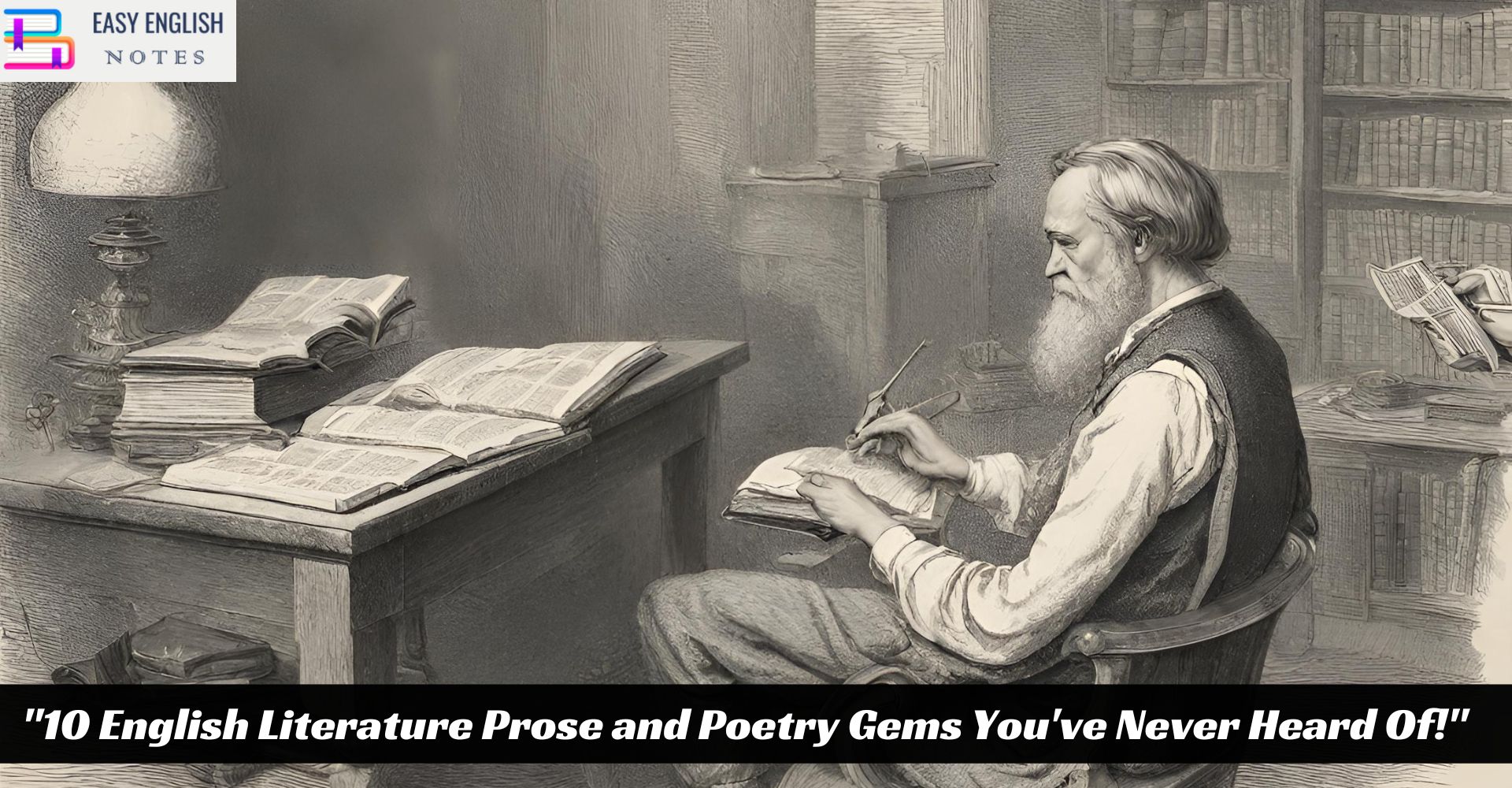Are you ready to dive into the uncharted waters of “English literature prose and poetry”? Imagine uncovering a treasure trove of literary masterpieces that have somehow slipped under the radar, waiting for their moment in the spotlight. “10 English Literature Prose and Poetry Gems You’ve Never Heard Of!” is your exclusive guide to these hidden wonders. These works are not just any pieces; they are profound expressions of human emotion, intricate narratives, and lyrical beauty that have remained elusive to the mainstream reader. From the hauntingly beautiful to the ingeniously crafted, each entry on our list promises to spark a new love for the depth and diversity of English literature. Whether you’re a seasoned bibliophile or a curious newcomer, these gems are poised to captivate your imagination and stir your soul. Let’s embark on this literary journey together, and I promise, you’ll emerge with a newfound appreciation for the art of prose and poetry.
In the vast universe of English literature prose and poetry, there lie hidden gems that have quietly dazzled a few while remaining unknown to many. Today, let’s embark on a literary adventure, unearthing “10 English Literature Prose and Poetry Gems You’ve Never Heard Of.” These pieces, with their unique charm and profound depth, promise to enrich your reading experience and introduce you to new horizons of thought and emotion.
1. “The Garden of Forking Paths” by Jorge Luis Borges
While Borges is a name many associate with magical realism, this particular piece—a mesmerizing blend of narrative innovation and philosophical inquiry—transports the reader into a labyrinth of time and space. Borges crafts a story that is not just read but experienced, challenging our perceptions of choice and destiny.
2. “Pale Fire” by Vladimir Nabokov
Nabokov’s novel, presented as a 999-line poem with a commentary that spirals into an entirely different story, is a masterclass in literary form. This work blurs the lines between prose and poetry, inviting readers into a complex interplay of narratives that question the very nature of authorship and reality.
Google Ads PPC Training Digital – membership area
An Exclusive Blood Sugar Balancing And Weight Loss
3. “The Waves” by Virginia Woolf
Woolf’s experimental novel, told through soliloquies of six characters, is a testament to her innovative use of language and structure. “The Waves” transcends traditional storytelling, offering a poetic exploration of individual consciousness and the interconnectedness of human experiences.
4. “Autobiography of Red” by Anne Carson
This novel in verse reimagines the myth of Geryon and Herakles in contemporary settings, blending elements of Greek mythology, modern poetry, and narrative prose. Carson’s work is a haunting, vivid portrayal of love, loss, and the search for identity.
5. “Invisible Cities” by Italo Calvino
Calvino’s collection of prose poems describes imaginary cities, each reflecting aspects of human nature, society, and the physical world. This book is a journey through imagination and insight, revealing the infinite possibilities contained within the spaces we inhabit and dream of.
6. “The Collected Works of Billy the Kid” by Michael Ondaatje
Before he was known for “The English Patient,” Ondaatje explored the blurring of genres with this fascinating mix of poetry, prose, and historical fiction. Through fragmented narratives and lyrical passages, Ondaatje delves into the myth and reality of the American West.
7. “Spoon River Anthology” by Edgar Lee Masters
Masters’ collection of free verse epitaphs provides a panoramic view of life and death in a small American town. Through the voices of the dead, Masters crafts a mosaic of stories that together form a poignant, comprehensive exploration of community and individuality.
8. “The God of Small Things” by Arundhati Roy
While Roy’s novel is celebrated in literary circles, its poetic quality is often overshadowed by its narrative prowess. The novel’s lyrical prose weaves a complex tale of family, politics, and love, grounded in the lush landscapes of Kerala, India.
9. “Grief is the Thing with Feathers” by Max Porter
A stunning blend of prose and poetry, Porter’s book navigates the murky waters of grief with a surprising companion—a crow. This work is an innovative, deeply moving exploration of loss and healing, demonstrating the power of storytelling in processing our deepest emotions.
10. “The Man Who Was Thursday” by G.K. Chesterton
Chesterton’s metaphysical thriller combines elements of political satire, philosophical ponderings, and poetic allegories. The novel’s engaging narrative and underlying questions about order, chaos, and faith make it a compelling read that defies easy categorization.
Also Read :
- Compare Hamlet with Macbeth, Othello and other Tragedies
- “The Pardoner’s Tale” is the finest tale of Chaucer
- Prologue to Canterbury Tales – (Short Ques & Ans)
- Confessional Poetry – Definition & meaning
- Line By Line Explanation Of The Poem The Eve of St. Agnes
In these works of English literature prose and poetry, we find a common thread—the courage to explore and experiment with form, content, and language. Each piece offers a unique perspective on the human condition, encouraging readers to look beyond the surface and engage with the text on a deeper level.
Whether you’re drawn to the philosophical inquiries of Borges, the lyrical narrative of Woolf, or the mythological modernity of Carson, these gems provide a rich tapestry of literary exploration. They remind us that literature is not just about the stories told but how they’re told, and the endless possibilities that lie in the act of storytelling.
So, dear reader, I invite you to delve into these works of English literature prose and poetry. Let them inspire you, challenge you, and open your eyes to the beauty and complexity of the world as conveyed through the written word. Happy reading!











